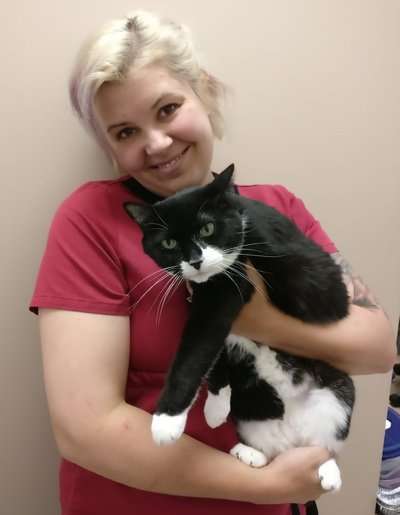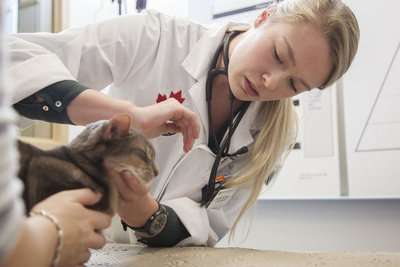Many veterinarians aren't comfortable talking about fat cats

As many as two-thirds of North American cats are obese, and just like in humans, obesity can shorten their lives and cause a long list of health issues including diabetes, osteoarthritis and cardiovascular problems. Yet, it can be difficult for veterinarians to talk with someone about their fat cat.
It's a sensitive topic, partly because of how humans feel about their own food and eating habits. "We eat to celebrate, we eat to mourn we have ritual feasts. People have a lot of thoughts, feelings and beliefs around food and feeding—not just themselves but with their pets," says Alexandra Phillips, who completed her master's at the University of Calgary Faculty of Veterinary Medicine (UCVM) studying communication with pet owners regarding their pets' diet and weight management.
In a paper published in Frontiers in Veterinary Science, Phillips and her colleagues studied videos of 17 veterinarians in 123 different appointments with overweight cats. Of these, only 12 veterinarians in 25 appointments talked about feline obesity with the cat owner. "These conversations are frequently lacking an in-depth and clear recommendation and assessment of obesity," says Phillips, whose graduate work was supervised by Cindy Adams, a professor of clinical communications at UCVM.
Fluffy is overweight
"Everyone is dancing around the topic and what we're finding is there's often not a clear: 'Fluffy is overweight and needs to lose weight and here's what needs to be done to manage that.'"

The videos, taped in a number of clinics in southeastern Ontario, show veterinarians trying to strengthen their bond with the client and using humour by speaking to the cats directly. The clients also used humour to try to deal with the discomfort. "There's a lot of joking around, building the relationship with some light humour but sometimes that falls flat," Phillips says. "By and large what we're finding is there's a bit of a communication breakdown between veterinarian and client."
'Loving through treats' may contribute to obesity problem
Obesity is complex and people can face obstacles to feeding their cat less food. They may have more than one cat at home, making it hard to change the diet of just one. Some people are used to giving their cat unlimited access to food throughout the day—'free-feeding'. And many people give their cats too many treats.
"It's part of the human-animal bond," says Phillips. "We're seeing that 'loving through treats' is part of the problem."
The study suggests veterinarians could benefit from more training in how to ask about a cat's diet and the client's thoughts around feeding to better navigate the conversation about managing feline obesity.
"I'd love to see some further research into how veterinarians can tackle these difficult and sensitive subject matters to identify client uptake and obstacles," says Phillips, a zookeeper at the Calgary Zoo. "You can be the greatest clinician in the world or have the greatest solutions but if it's not something people can achieve, it's pointless."
More information: Alexandra M. Phillips et al. Feline Obesity in Veterinary Medicine: Insights from a Thematic Analysis of Communication in Practice, Frontiers in Veterinary Science (2017). DOI: 10.3389/fvets.2017.00117
Provided by University of Calgary


















